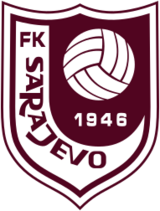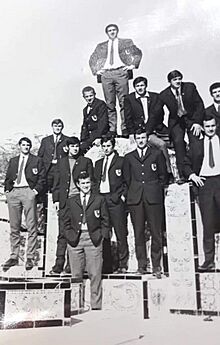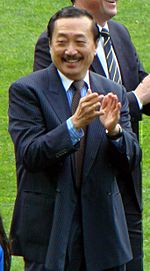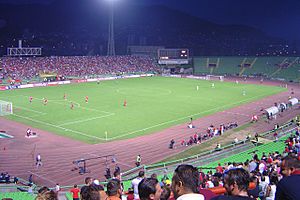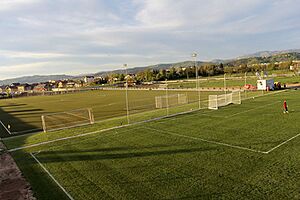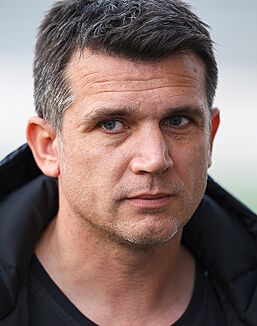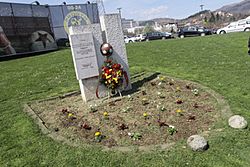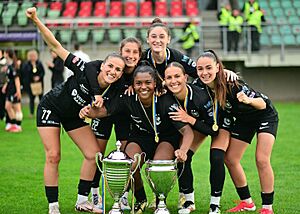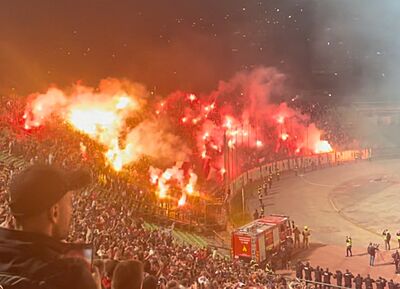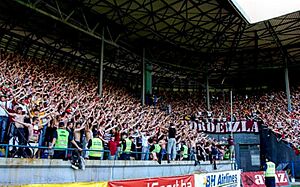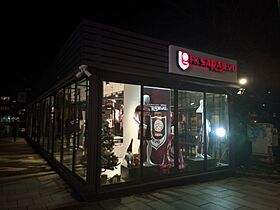FK Sarajevo facts for kids
Fudbalski klub Sarajevo, often called FK Sarajevo, is a professional football club from Sarajevo, the capital city of Bosnia and Herzegovina. It is the most successful football club in the country.
FK Sarajevo was started on October 24, 1946. It was the most successful club from Bosnia and Herzegovina during the time of Yugoslavia. The club won two Yugoslav First League titles and reached the Yugoslav Cup final twice.
Today, FK Sarajevo is a top team in the Premier League of Bosnia and Herzegovina. They have won five Bosnian championships, eight Bosnian Cups, and one Bosnian Supercup. The club is also very popular, especially with its rival, FK Željezničar. Their matches are called the Sarajevo derby or the Eternal derby. This rivalry is famous worldwide.
The team plays its home games at the Asim Ferhatović Hase Stadium, also known as the Koševo Stadium. It is named after a famous club player, Asim Ferhatović. The stadium can hold over 30,000 fans and is the biggest in Bosnia and Herzegovina. FK Sarajevo also has a modern training center called Butmir Training Centre. It opened in 2015 and is used by the men's, women's, and youth teams.
The club's main colors are maroon and white. Their home uniform is usually a maroon shirt, white shorts, and maroon socks. This color combination is well-known in Bosnian sports. The club's nickname is the Maroon-Whites. They are also sometimes called The Giants, inspired by their official anthem.
FK Sarajevo is known for developing talented football players in Bosnia and Herzegovina. Many of its players have moved to big European leagues. This success comes from their excellent youth academy.
Beyond football, FK Sarajevo is important to the city's culture. It shows Sarajevo's diverse character and has many fans from different communities.
Contents
- Club History and Achievements
- Club Colors and Crest
- Stadium and Training Grounds
- Club Organization
- Club Trophies
- Players and Staff
- Technical Staff
- Historical Leaders
- Memorials and Honors
- Club Records
- Women's Football Team
- Club Supporters
- Rivalries
- Club Media
- Club Connections
- Kit and Sponsors Over Time
- Awards
- See also
Club History and Achievements
How the Club Started
FK Sarajevo was the only major football club created by the government in Sarajevo after World War II. The club began on October 24, 1946. It was formed by combining two local clubs, Udarnik and Sloboda. The new club was first called Fiskulturno društvo Torpedo. Later, its name changed a few times before becoming Fudbalski klub Sarajevo in 1949.
In September 1948, famous Yugoslav player Miroslav Brozović joined the team as a player-manager. He helped the team get promoted to the top league, the Yugoslav First League. FK Sarajevo played its first European competition in the 1960 Mitropa Cup.
Winning the First Championship
Before FK Sarajevo, no club from Bosnia and Herzegovina had won the Yugoslav First League title. The league was usually won by teams from Serbia and Croatia. But in the 1966–67 season, FK Sarajevo made history by becoming champions. This was a huge moment for Bosnian football.
A key player during these early years was the legendary striker Asim Ferhatović. He played for the club from 1952 to 1967 and was the top scorer in the league in 1963–64. In the 1966–67 season, Sarajevo started strong and kept winning. They beat big teams like Hajduk Split and Red Star Belgrade. By the winter break, they were in first place.
Sarajevo reached the 1966–67 Yugoslav Cup final but lost to Hajduk Split. However, they quickly bounced back. In their final league match, they beat Čelik Zenica 5–2 in front of 30,000 fans, winning their first league title.
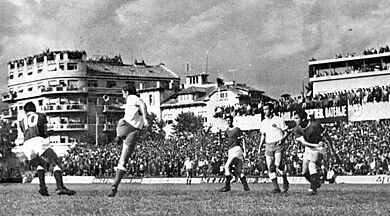
Playing in the European Cup
Winning the league meant Sarajevo qualified for the 1967–68 European Cup (now the UEFA Champions League). They won their first match against Olympiakos Nicosia from Cyprus. In the next round, they played against the famous English team Manchester United. Sarajevo drew the first game 0–0 at home. In the second game at Old Trafford, Manchester United won 2–1, and Sarajevo was knocked out. Manchester United went on to win the competition that year.
After their first title, the team had some ups and downs. Many key players left the club. However, in 1973, a young player named Safet Sušić joined. He would become a club legend and help lead the team to another successful period.
Second Championship Win in the 1980s
FK Sarajevo had another great period between 1978 and 1985. This was thanks to the amazing attacking duo of Predrag Pašić and Safet Sušić. Sušić was a fantastic playmaker and top scorer.
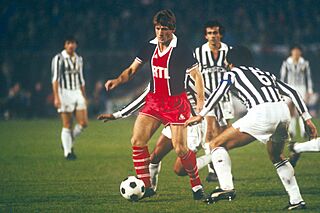
In the 1979–80 season, Sarajevo finished second in the league and qualified for the 1980–81 UEFA Cup. They were knocked out by German team Hamburger SV. In the 1982–83 season, they reached the Round of 16 but lost to RSC Anderlecht, who later won the competition. That same season, Sarajevo also reached the 1982–83 Yugoslav Cup final but lost to Dinamo Zagreb.
Sarajevo won their second championship title in the 1984–85 season. They finished four points ahead of Hajduk Split. The team had a strong second half of the season. In the final game, they needed just one point against Red Star Belgrade at a packed Koševo Stadium. Sarajevo won 2–1, securing their second Yugoslav league title. This win qualified them for the 1985–86 European Cup, but they had a surprising early exit, losing to Finnish side Kuusysi Lahti.
After this second championship, many important players left the club. The team went through a difficult period until the early 1990s. Football in Bosnia and Herzegovina stopped completely during the Bosnian War.
Recent Years and New Success
After Bosnia and Herzegovina became independent, FK Sarajevo continued to be a leading club. During the Bosnian War, the club went on a world tour to gain international support for the country. They played friendly matches against teams like Parma F.C. and the Iranian national team.
Since independence, the club has won 14 domestic trophies, including five Premier League titles. They have also reached the final qualifying rounds for European competitions several times.
Vincent Tan's Investment
In late 2013, Vincent Tan, a businessman from Malaysia who owns Cardiff City, bought FK Sarajevo. He promised to invest money into the club. Under his ownership, the club signed new players and won the 2013–14 Bosnian Cup. This was their first trophy in several years.
In 2014–15, FK Sarajevo reached the play-off round of the Europa League, but lost to German team Borussia Mönchengladbach. In 2015, the club signed a big sponsorship deal with Turkish Airlines. On May 30, 2015, the team won the league title after an eight-year wait.
Club's Domestic Revival
Since March 2019, Vietnamese businessman Nguyễn Hoài Nam and PVF Investment and Trading, JSC, have run FK Sarajevo. The club won back-to-back Bosnian Premier League titles in 2018–19 and 2019–20, and also won the 2018–19 Bosnian Cup.
The club faced financial challenges during the COVID‑19 pandemic. However, in 2021 and 2023, Bosnian-American businessman Ismir Mirvić became a major investor and then club president. Vincent Tan also became more involved again. This led to new investments and the club winning the 2024–25 Bosnian Cup, ending a five-season trophy drought.
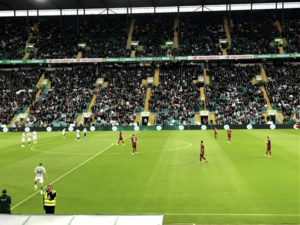
Club Colors and Crest
The club's main colors are maroon and white. The home uniform is usually a maroon jersey, white shorts, and maroon socks. These colors are very recognizable in Bosnian sports.
The club's original colors were sky blue and white. In 1962, the club changed to maroon after a suggestion from a former player, Lav Mantula. He thought maroon would make the team stand out, as no other team in Yugoslavia used it as their main color.
The club's crest has changed over the years. The first crest had a red star, a common symbol in post-WWII Yugoslavia. In 1949, a golden outline of a footballer and a blue gear were added. In 1962, the crest became badge-shaped, showing the club's name, the communist star, a football, and the founding year.
After the Bosnian War in 1996, the communist star was replaced with a Bosnian fleur-de-lis. This was a common change for Bosnian football clubs at the time. In 2007, the fleur-de-lis was removed, and the current crest does not have any national symbols. However, older crests are still used on club merchandise.
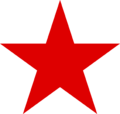 |
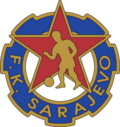 |
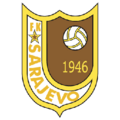 |
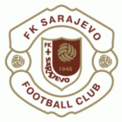 |
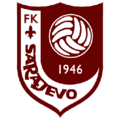 |
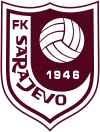 |
| 1946–1949 | 1949–1962 | 1962–1992 | 1995–2001 | 2001–2007 | 2007–present |
Stadium and Training Grounds
FK Sarajevo plays its home matches at the Asim Ferhatović Hase Stadium. This stadium is also known as the Koševo Stadium. The City of Sarajevo owns it, but the club leases and operates it. The stadium can hold 30,121 people.
The stadium opened in 1947 and was named after the Koševo neighborhood. In 1984, it was rebuilt for the 1984 Winter Olympics held in Sarajevo. It is sometimes called The Olympic Stadium. On February 7, 1984, the stadium hosted the opening ceremony of the games.
In 2004, the stadium was officially renamed Asim H. Ferhatović to honor the legendary FK Sarajevo striker Asim Ferhatović. The stadium has hosted many famous clubs like Manchester United and Real Madrid. The highest number of fans at the stadium was about 60,000 during a match between FK Sarajevo and FK Željezničar in 1981–82.
The club's training facility is the Butmir Training Centre, located in Ilidža. It opened in October 2015 and covers a large area. The center has many pitches, gyms, and medical facilities. It is used by the first team, youth academy, B team, and women's team.
The main artificial turf pitch at the center is named after Želimir Vidović. He was a former Sarajevo player who died during the Siege of Sarajevo while helping civilians. A statue of him stands near the pitch.
Club Organization
Ownership and Money
FK Sarajevo is set up as a special type of company where members contribute money to help run the club. The biggest contributors get to control the club's decisions.
Vincent Tan, a Malaysian billionaire, became the main contributor in December 2013. He invested money and helped manage the club's finances. In September 2015, the club paid off all its debts, becoming one of the few debt-free clubs in Eastern Europe.
In March 2019, a Vietnamese businessman, Nguyễn Hoài Nam, and PVF Investment and Trading, JSC, took over most of the ownership. In August 2021, Vincent Tan and Bosnian-American businessman Ismir Mirvić bought back most of the club. Mirvić became the club president. As of September 2022, both Tan and Mirvić own 49.13% of the club.
Sponsors
The club's main sponsor is Turkish Airlines. They signed a big contract in 2015, which was extended in 2022. FK Sarajevo's uniforms have been made by Adidas since 2023. The club also works with other partners like Tourism Malaysia, Courtyard by Marriott, and Telemach.
Club Leadership
Here are the people who help run FK Sarajevo:
Board of DirectorsAs of April 3, 2022
|
Supervisory BoardAs of September 19, 2023
|
Club Management
As of July 4, 2025
| Position | Nationality | Name |
|---|---|---|
| President | Ismir Mirvić | |
| President of Assembly | Adnan Hadžimuratović | |
| Sporting director | Matthias Leterme | |
| Managing director | Vacant | |
| Technical director | Krste Velkoski | |
| General secretary | Jasmila Hodžić | |
| Advisory commission chairman | Mehmed Janjoš | |
| Youth academy director | Alen Škoro | |
| Director of women's football | Samira Hurem | |
| Head of scouting | Toni Bilandžić | |
| Head of youth scouting | Ivan Matić | |
| Head of finances | Merisa Peco Čukurija | |
| Head of accounting | Salko Ćimić | |
| Head of legal department | Ajna Ključanin | |
| Chief legal officer | Jasmila Hodžić | |
| Creative director | Joe Peters | |
| LBC project manager | Maja Kurić | |
| Marketing director | Faruk Čengić | |
| PR manager | Hena Rizvanović | |
| Press officer | Vedad Šurković | |
| Head of content | Azra Numanović | |
| Head of retails | Kenan Avdić | |
| Head of security | Zlatan Čakal |
Helping the Community
FK Sarajevo is known for its strong commitment to social responsibility. The club has a foundation that supports education and healthy living for children, young people, and families in need. They also donate money to help communities and schools.
The club organizes blood donation events every month and raises awareness about health issues. They also hold an annual art competition for primary school children to design a team mascot. The top three artists receive scholarships.
FK Sarajevo also supports women's rights. They sponsor a shelter for women and offer free stadium entry to all female fans during the week of International Women's Day. The club has a long partnership with the Bosnian charity "Pomozi.ba," working together on many projects.
The club helps the town of Srebrenica by giving scholarships to hundreds of children and sponsoring the local football team, FK Guber. FK Sarajevo was also part of a project called "Give Football A Chance," which helped improve the health and education of children in conflict areas.
After the 2014 Southeast Europe floods, FK Sarajevo helped a lot with relief efforts. They sent volunteers and helped fund home rebuilding. The club's owner, Vincent Tan, also donated money to hospitals. In January 2016, Sarajevo hosted Syrian refugee children with UNICEF and the Red Cross.
In October 2024, the club started a breast cancer awareness campaign called "FK Sarajevo For the Cure." Players wore special pink and maroon uniforms to support the cause.
The club also created the annual Želimir Vidović Keli Award in 2019 for humanitarian work.
Club Trophies
Domestic League Titles
- Premier League of Bosnia and Herzegovina:
- Winners (5): 1998–99, 2006–07, 2014–15, 2018–19, 2019–20
- Runners-up (7): 1994–95, 1996–97, 1997–98, 2005–06, 2010–11, 2012–13, 2020–21
- Yugoslav First League:
- Winners (2): 1966–67, 1984–85
- Runners-up (2): 1964–65, 1979–80
- Yugoslav Second League:
- Winners (1): 1948–49
Domestic Cups
- Bosnia and Herzegovina Cup:
- Winners (8): 1996–97, 1997–98, 2001–02, 2004–05, 2013–14, 2018–19, 2020–21, 2024–25 (record)
- Runners-up (4): 1998–99, 2000–01, 2016–17, 2021–22
- Yugoslav Cup:
- Runners-up (2): 1966–67, 1982–83
- Supercup of Bosnia and Herzegovina:
- Winners (1): 1997
- Runners-up (2): 1998, 1999
European Competitions
- European Cup / UEFA Champions League:
- (Best) Round of 16 (1): 1967–68
- UEFA Cup / UEFA Europa League:
- (Best) Round of 16 (1): 1982–83
Winning Doubles
- Premier League and National Cup (1): 2018–19
Players and Staff
Current Squad
|
|
Youth Academy Players
These are players from the FK Sarajevo Academy who have been called up to the first team.
|
|
Players on Loan
|
Ismir Pintol Trophy
The Ismir Pintol trophy is given to the best player of the past season. It is named after Ismir Pintol, a young FK Sarajevo fan who passed away. Fans vote for the winner on the club's supporters' website. The trophy has been awarded since 2003.
- Winners
| Season | Player | Season | Player |
|---|---|---|---|
| 2002–03 | 2014–15 | ||
| 2003–04 | Not awarded | 2015–16 | |
| 2004–05 | 2016–17 | ||
| 2005–06 | 2017–18 | Not awarded | |
| 2006–07 | 2018–19 | ||
| 2007–08 | 2019–20 | ||
| 2008–09 | 2020–21 | ||
| 2009–10 | Not awarded | 2021–22 | Not awarded |
| 2010–11 | 2022–23 | Not awarded | |
| 2011–12 | Not awarded | 2023–24 | |
| 2012–13 | 2024–25 |
Youth Department
The FK Sarajevo Youth Department has two parts: The Asim Ferhatović Hase School of Football and the FK Sarajevo Academy. The school helps popularize football and finds local talent. The academy is a top boarding school that trains the best young players from Bosnia and Herzegovina. It has been one of the best youth systems in former Yugoslavia.
Technical Staff
As of April 15, 2025, the staff includes:
| Position | Name |
|---|---|
| Manager | |
| Assistant coach | |
| Assistant coach | |
| Goalkeeping coach | |
| Video analyst | |
| Fitness coach | |
| Medical team coordinator | |
| Doctor | |
| Doctor | |
| Senior Physiotherapist | |
| Physiotherapist | |
| Physiotherapist | |
| Nutritionist | |
| Team manager | |
| Equipment manager |
Historical Leaders
Club Presidents
Here is a list of FK Sarajevo presidents from 1946 until today.
| Name | Years |
|---|---|
| 1946–1947 | |
| 1948–1949 | |
| 1949–1950 | |
| 1950–1951 | |
| 1952–1953 | |
| 1953–1954 | |
| 1955–1956 | |
| 1957–1959 | |
| 1959–1961 | |
| 1962–1963 | |
| 1964–1967 | |
| 1967–1968 | |
| 1969–1970 | |
| 1970–1971 |
| Name | Years |
|---|---|
| 1972–1973 | |
| 1973–1974 | |
| 1974–1981 | |
| 1981–1983 | |
| 1983–1984 | |
| 1985–1987 | |
| 1988 | |
| 1988–1992 | |
| 1992–1999 | |
| 1999–2000 | |
| 2000–2001 | |
| 2001–2002 | |
| 2002 | |
| 2002–2004 |
| Name | Years |
|---|---|
| 2004–2005 | |
| 2005 | |
| 2005–2010 | |
| 2010 | |
| 2010 | |
| 2010–2012 | |
| 213–2014 | |
| 2014–2016 | |
| 2016–2019 | |
| 2019–2021 | |
| 2021 | |
| 2021–present |
Club Managers
Here is a list of FK Sarajevo managers from 1946 until today.
| Name | Nationality | Years |
|---|---|---|
| Josip Bulat | 1946–1947 | |
| Slavko Zagorac | 1947–1948 | |
| Miroslav Brozović | 1948–1952 | |
| Slavko Zagorac | 1952–1953 | |
| Aleksandar Tomašević | 1953 | |
| Slavko Zagorac | 1953 | |
| Miroslav Brozović | 1954–1956 | |
| Slavko Zagorac | 1956 | |
| Aleksandar Tomašević | 1956–1958 | |
| László Fenyvesi | 1958 | |
| Vojin Božović | 1958–1959 | |
| Miroslav Brozović | 1959–1961 | |
| Ratomir Čabrić | 1961–1963 | |
| Abdulah Gegić | 1963–1965 | |
| Aleksandar Atanacković | 1965–1966 | |
| Miroslav Brozović | 1966–1967 | |
| Franjo Lovrić | 1967 | |
| Munib Saračević | 1967–1969 | |
| Miroslav Brozović | 1969−1970 | |
| Srboljub Markušević | 1970–1971 | |
| Abdulah Gegić | 1971–1972 | |
| Srboljub Markušević | 1972–1973 | |
| Svetozar Vujović | 1973–1974 | |
| Mirsad Fazlagić | 1974–1975 | |
| Vukašin Višnjevac | 1975–1977 | |
| Fuad Muzurović | 1977–1981 | |
| Srboljub Markušević | 1981–1983 | |
| Boško Antić | 1983–1986 | |
| Denijal Pirić | 1986–1988 | |
| Džemaludin Mušović | 1988–1990 | |
| Rajko Rašević | 1990 | |
| Srboljub Markušević | 1990 | |
| Fuad Muzurović | 1990–1995 | |
| Denijal Pirić | 1995–1996 | |
| Nermin Hadžiahmetović | 1996–1997 | |
| Mehmed Janjoš | 1997–1998 | |
| Nermin Hadžiahmetović | 1998–1999 | |
| Sead Jesenković | 1999 |
| Name | Nationality | Years |
|---|---|---|
| Agim Nikolić | 1999 | |
| Denijal Pirić | 2000–2001 | |
| Husref Musemić | 2001 | |
| Fuad Muzurović | 2001–2002 | |
| Husref Musemić | 2002–2003 | |
| Agim Nikolić | 2003–2004 | |
| Kemal Alispahić | 2004 | |
| Edin Prljača | 2004 | |
| Husref Musemić | 2005–2008 | |
| Šener Bajramović | 2008 | |
| Husnija Arapović | 2008 | |
| Mehmed Janjoš | 2008–2010 | |
| Mirza Varešanović | 2010–2011 | |
| Jiří Plíšek | 2011 | |
| Dragan Jović | 2012–2013 | |
| Husref Musemić | 2013 | |
| Abdulah Oruč (interim) | 2013 | |
| Robert Jarni | 2013–2014 | |
| Dženan Uščuplić | 2014 | |
| Meho Kodro | 2014–2015 | |
| Dženan Uščuplić | 2015 | |
| Almir Hurtić (interim) | 2015 | |
| Miodrag Ješić | 2015–2016 | |
| Almir Hurtić | 2016 | |
| Mehmed Janjoš | 2016–2017 | |
| Senad Repuh | 2017 | |
| Husref Musemić | 2017–2019 | |
| Vinko Marinović | 2019–2021 | |
| Dženan Uščuplić (interim) | 2021 | |
| Goran Sablić | 2021 | |
| Aleksandar Vasoski | 2022 | |
| Dženan Uščuplić (interim) | 2022 | |
| Feđa Dudić | 2022 | |
| Emir Obuća (interim) | 2022 | |
| Mirza Varešanović | 2022–2023 | |
| Mensur Dogan (interim) | 2023 | |
| Simon Rožman | 2023–2024 | |
| Zoran Zekić | 2024– |
Technical and Sporting Directors
Here is a list of FK Sarajevo's Technical and Sporting Directors and when they worked for the club.
| Name | Years |
|---|---|
| Svetozar Vujović (director) | 1974 – 1992 |
| Mirza Varešanović | August 11, 2004 – June 30, 2006 |
| Senad Merdanović | August 24, 2006 – December 29, 2010 |
| Edin Hadžialagić | January 19, 2011 – February 17, 2012 |
| Abdulah Ibraković | August 26, 2013 – September 23, 2015 |
| Faruk Ihtijarević | August 16, 2016 – May 24, 2018 |
| Emir Hadžić | May 24, 2018 – April 18, 2021 May 23, 2022 – November 23, 2022 |
| Senijad Ibričić | August 3, 2023 – June 3, 2024 |
Memorials and Honors
The club has created memorials to honor important people and events in its history.
- Horde zla
- A memorial outside the north stand of the Asim Ferhatović Hase Stadium honors the hundreds of club supporters, called Horde zla, who died defending the city during the Siege of Sarajevo.
- Svetozar Vujović
- Svetozar Vujović played for the club and later became its director for over twenty years. He stayed in Sarajevo during the siege and passed away in 1993. The club's main lounge is named "The Svetozar Vujović Salon" in his honor.
- Asim Ferhatović
- Asim Ferhatović was a legendary forward and the club's all-time leading scorer. The Koševo Stadium is named after him, and the club's School of Football is also named in his honor.
- Želimir Vidović
- Želimir Vidović was a great player in the 1970s and 1980s. He was killed during the Siege of Sarajevo in 1992 while helping wounded civilians. An annual tournament is held in his honor, and the main pitch at the Butmir Training Centre is named after him. A statue of him stands near the field.
- Ismir Pintol was a 6-year-old FK Sarajevo fan who passed away in 2002. The club and its supporters created the Ismir Pintol trophy in his memory, given to the best player each season. Fans remain seated in silence for the first six minutes of the final home game each season to honor him.
- Vedran Puljić
- Vedran Puljić was a 24-year-old member of the club's fan group, Horde zla. He was killed during the Široki Brijeg football riots in 2009. The north stand of Koševo Stadium, where Horde zla gathers, was named in his honor in 2013. The club holds a vigil at his gravesite every year.
Club Records
FK Sarajevo, then called Torpedo, played its first match on November 3, 1946, winning 6–0 against Bratstvo Travnik. The club's first official European match was on July 18, 1960.
Ibrahim Biogradlić holds the record for the most club appearances, playing 646 games between 1951 and 1967. The top goal scorer in official matches is Asim Ferhatović, with 100 goals. Over 50 FK Sarajevo players have played for the Yugoslav and Bosnian national teams.
FK Sarajevo was the most successful club from Bosnia and Herzegovina in the Yugoslav First League, winning two titles. They are also the record-holder for the most Bosnian Cup wins (8).
Women's Football Team
FK Sarajevo also has a women's football team called SFK 2000. The team joined the men's club in 2015 and uses the same crest and colors. They play home games at the Butmir Training Centre and European matches at Koševo Stadium.
SFK 2000 is the strongest team in Bosnian women's football. They have won 23 national titles and 22 national cups in a row. They also represent Bosnia and Herzegovina in European competitions. They have reached the Round of 32 in the UEFA Women's Champions League four times.
SFK 2000 is known for developing young female players. Many top female footballers from Bosnia and Herzegovina have come from SFK's academy. The club also promotes girls' participation in sports. As of December 17, 2024, SFK 2000 is ranked 30th in Europe.
Club Supporters
FK Sarajevo is one of the most popular clubs in Bosnia and Herzegovina. They have many fans across the country and in other parts of the world where Bosnians live. The largest fan group outside Bosnia is in Stuttgart, Germany.
FK Sarajevo fans are historically called Pitari. This nickname comes from the local Bosnian dish pita. It was originally used by rival fans to describe Sarajevo supporters as being from wealthier, older parts of the city.
The organized supporters' group is called Horde zla (meaning Hordes of Evil). It was formed in 1987 and sits on the north stand of the Asim Ferhatović Hase Stadium. Their logo features the Grim Reaper.
Another important fan group is Maroon Friends 1946. This group includes influential people who work to support the club locally and internationally.
Rivalries
Sarajevo Derby
FK Sarajevo's biggest rivalry is with FK Željezničar, another club from Sarajevo. Their matches are known as the Sarajevo derby or the Eternal derby. These games are famous for the passion of both fan groups. Fans use fireworks, flags, and giant posters to create an exciting atmosphere.
The rivalry started because of the historical differences between the city's working class and wealthier residents. Željezničar was seen as the club of the working class, while Sarajevo was supported by those from the older, central parts of the city. The first official league match between them was in 1954, which FK Sarajevo won 6–1. This is still the biggest win in the Sarajevo derby.
As of April 27, 2025, 155 Sarajevo derbies have been played. FK Sarajevo has won 46 times, FK Željezničar has won 47 times, and there have been 62 draws.
Other Rivalries
Sarajevo also has a strong rivalry with Čelik Zenica because their cities are close. A newer rivalry has developed with Široki Brijeg after the Široki Brijeg riots. These events led to the death of a Sarajevo supporter, Vedran Puljić. Since then, matches between these two teams have been very tense.
Recently, Sarajevo has also developed rivalries with Zrinjski Mostar and Borac Banja Luka. These rivalries are strong because these three clubs have been the most successful in Bosnian football over the last ten years. Their matches often decide who wins the league title.
Club Media
Bordo TV
Bordo TV is an online streaming platform run by FK Sarajevo. It shows content about the club in both Bosnian and English. It started in 2010 as an internet TV channel and became an independent streaming service in 2018.
Bordo Fan Magazine
Bordo Fan is a monthly magazine for FK Sarajevo club members. It started in 2010 as a small fan magazine and later became the club's official publication. It includes reports on matches, information about youth teams, and interviews with players.
Sarajevo Podcast
Sarajevo Podcast is the club's official podcast. You can listen to it on YouTube, Apple Music, and Spotify.
Club Connections
USD Bosna
FK Sarajevo has a close relationship with USD Bosna (University Sport Society Bosna). This society was founded in 1947 to organize university sports clubs in Sarajevo. It was the largest sports society in Bosnia and Herzegovina, with teams in 19 sports. Famous members include KK Bosna Visit Sarajevo, which won the Euroleague Basketball title in 1979, and RK Bosna Sarajevo, a handball club.
This connection comes from their shared maroon and white colors. Many FK Sarajevo fans also supported KK Bosna, forming a "Maroon Family." FK Sarajevo has signed agreements to strengthen ties with both KK Bosna and RK Bosna Sarajevo.
Affiliated Clubs
 Cardiff City
Cardiff City Radnik Hadžići (farm team)
Radnik Hadžići (farm team)
Kit and Sponsors Over Time
| Period | Supplier | Shirt sponsor |
|---|---|---|
| 1968 | Alhos | |
| 1968–1970 | Hena | |
| 1971 | Osiguravajući Zavod Sarajevo | |
| 1972 | None | Šipad |
| 1973–1974 | None | Ključ |
| 1973–1976 | Feroelektro Energopetrol |
|
| 1976-1977 | Adidas | Baza |
| 1977–1980 | YASSA | |
| 1980–1981 | Puma | Vitex Visoko |
| 1981–1982 | Playground | Privredna banka Sarajevo |
| 1982–1983 | UNIS Pobjeda Tešanj |
|
| 1983–1984 | Jutro | |
| 1984–1985 | Admiral | Alhos Energoinvest |
| 1985–1986 | Bosna Auto Kraš |
|
| 1986–1988 | JAT Gorenje |
|
| 1988–1989 | Patrick | Kraš Nissan |
| 1989–1991 | Uhlsport | Volkswagen Audi |
| 1992 | Cenex | |
| 1993–1994 | None | Vemex |
| 1994–1995 | Patrick | Patrick |
| 1995–1996 | Erreà | PTT BiH |
| 1996–1997 | Patrick | Sarajevo Tobacco Factory |
| 1997–2002 | Umbro | |
| 2001–2003 | NAAI | Aura |
| 2003–2004 | Lotto | |
| 2004–2008 | Legea | |
| 2008–2010 | Nike | |
| 2010–2011 | Legea | |
| 2011–2012 | Royal | |
| 2012–2013 | Lescon | |
| 2013–2015 | Haad | Visit Malaysia |
| 2015–2016 | Turkish Airlines | |
| 2016–2021 | Nike | |
| 2021–2023 | Erreà | |
| 2023– | Adidas |
Awards
See also
 In Spanish: FK Sarajevo para niños
In Spanish: FK Sarajevo para niños


